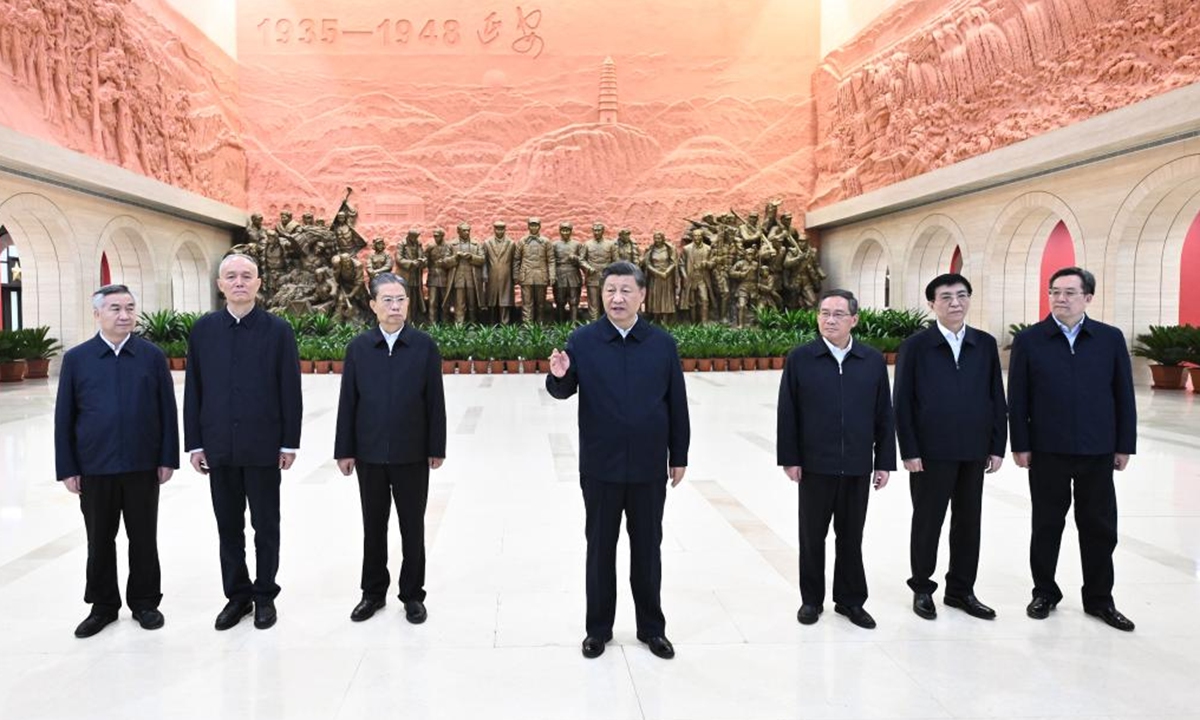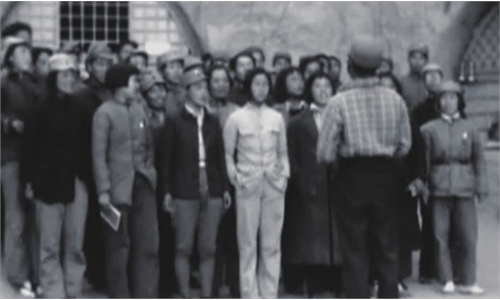
Xi Jinping delivers an important speech after visiting an exhibition on the 13 years of the Communist Party of China (CPC) Central Committee in Yan'an at the Yan'an Revolutionary Memorial Hall in Yan'an, northwest China's Shaanxi Province, October 27, 2022. Photo: Xinhua
Less than a week after the conclusion of the 20th National Congress of the Communist Party of China (CPC), General Secretary Xi Jinping led members of the Standing Committee of the Political Bureau of the CPC Central Committee to visit Yan'an.
Where is Yan'an? Why did they go there?
When the two political parties in the US are engaged in a head-on battle ahead of the upcoming midterm elections, when leaders in Western countries such as the UK and Italy change like a merry-go-round, when populism sweeps across the West and unity can hardly be achieved, the first collective trip of the new CPC central leadership sends a clear signal to the Chinese people and the world.
Yan'an, a city in Northwest China's Shaanxi Province, is a holy place and cradle of the Chinese revolution. During the 13 years in Yan'an, the Central Committee of the CPC formulated and implemented a series of correct paths, principles and policies, achieved great development of revolutionary forces, led the War of the Chinese People's Resistance against Japanese Aggression to the final victory, and laid a solid foundation for the victory of the new democratic revolution and the establishment of the People's Republic of China.
Yan'an holds the key to why China has grown from a poor and weak country to the world's second-largest economy. Only by understanding Yan'an can we understand the CPC, Chinese modernization, and why China insists on peaceful development.
At present, the US and the West have identified China as a "competitor," and are trying to hype the "China threat" theory by abusing the differences in ideology and political systems between the two sides and depicting China as a challenger to "order."
From the Yan'an trip of the new CPC leadership, they could see where the CPC, a party with more than 100 years of history, will lead China.
There is an old saying in China: "Reviewing the past helps with predicting the future." Reviewing the CPC's original aspiration and the history and experiences of the CPC's struggles enables one to see for whom the CPC is fighting.
It is fighting for the people.
The 20th National Congress of the CPC has established that, from this day forward, the central task of the CPC will be to lead the Chinese people of all ethnic groups in a concerted effort to realize the Second Centenary Goal of building China into a great modern socialist country in all respects and to advance the rejuvenation of the Chinese nation on all fronts through a Chinese path to modernization.
To put it directly, the CPC aims to empower the country to make sure it will not be invaded by imperialists and colonists and that every Chinese person can live a prosperous life. That is why the CPC insists on holding up to the spirit of Yan'an. From then to now, the members of the CPC passed on the spirit from generation to generation. They have no selfish interests and serve the people wholeheartedly. They have the courage to self-reform, keep pace with the times, and always maintain a sense of responsibility to the people.
Song Luzheng, a research fellow at the China Institute, Fudan University, told the Global Times that the fundamental function of a system is to provide necessary public goods, including security, order, and people's livelihoods.
"The US and European systems have great shortcomings in this regard, because the ruling party only cares about its own interests. By contrast, the CPC can break the shackles of interests, not be kidnapped by interest groups, and have the courage to reform itself," said Song.
The difficulty of governance varies from country to country, but whether the governance can be effective mainly depends on whether the government is responsible to the people. When it comes to governance, the West only emphasizes institutions, and the election of a "political amateur" has become a unique institutional product. Eloquence, image, gender, religion can all affect election results, but "responsibility" is not the most important factor. Those in power do not really care about the needs of the people and public goods, but only care about the interests of their own party. When the opposition party becomes the ruling party, it just repeats the same playbook.
Over the past few years, we have seen global crises and challenges become more frequent, and governance become more complicated. Black swan and gray rhino events can happen at any time with an increasing frequency. The whole world has been in a state of uncertainty. External changes have posed severe tests for ruling parties around the world.
The CPC has solved many governance problems that the US and other Western countries have failed to deal with. China does not cause trouble for the world, but injects impetus into the common development of the world by solving China's own problems.
The Chinese leaders' trip to Yan'an has demonstrated their confidence in realizing the stable, mature and predictable development goal. This is where China's advantage, and the CPC's advantage, lie.
China's stability and predictability under the leadership of the CPC is of global significance. Today's China has become the world's stabilizer and anchor for security.
The Chinese modernization led by the CPC is modernization of common prosperity for all. It is under the leadership of a strong party staying true to its original aspiration that the Chinese people have created a new path of a peaceful rise in the history of human development.
Edgar Snow, an American journalist who was famous for reporting on the Chinese revolution, wrote in his 1937 book Red Star Over China that the popularity of his book was not because of its style or form, but the stories which were created by the young Chinese revolutionaries. He believed the spirit, strength, desire and passion that made these people invincible represented the richest and most glorious characteristics of human history.


